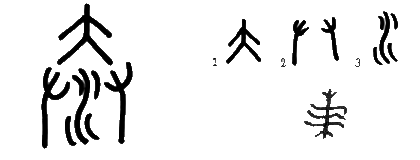I Ching, Yijing or Zhou Yi
"Oracle of the moon": © 2000 LiSe
 Yi Jing, Oracle of the Moon
Yi Jing, Oracle of the Moon

Taì, hexagram 11
Mount Taì
Mount Tai dominates the region of the lands of the Zhou in King Wen's time. Tai was "home", which is an eminent place or mindset.
Tai is about favors and blessings and receiving abundance and prosperity, but also about accepting every aspect of where you are at home.
If you ask the gods for blessings, you open your mind to see them. Some people find things in places where many others went before and found nothing. Happiness is the result of a state of mind, of 'being at home'.
On Mount Tai
Heaven and Earth are connected, yin and yang, mind and body. There you find the field of peace.

TAÌ:
The ideogram as a whole looks like a great mountain: Tai Shan himself,
in the West of Shandong. 'Tai wind' means West wind. He was for the Zhou
the most important of the 5 holy mountains, their most direct connection
with the divine ones.
At the top DA4 (1) the character
“great”, like the great peak of a mountain. Then two hands GONG3 (2), looking like the woods embracing its flanks, and at the foot in the
center “water” SHUI3 (3), the brooks and rivers running
down its slopes and bringing life and prosperity to the valley.
I found a very old version of the character tai: see at right, below the
moon. It is a picture of wind, blowing around a tree: the West Wind. So
Tai, the 'Eastern sacred mountain' is closely connected to the West wind
(blowing towards Mt. Tai, not from it).
TAI: Grand, great, eminent, supreme, excessive,
arrogant, spread out and reach everywhere, quiet, ease, good luck,
effortless, honorable, prosperous, too much, exaggerated, lofty; name of
a mountain
About Tai Shan and the other sacred mountains of
China: click here.
The trigrams: Heaven below Earth.
Heaven and Earth unite: Eminence.
The ruler fashions and completes the Tao of Heaven and Earth.
He supports mutually with Heaven and Earth their order.
He stands by the commoners.